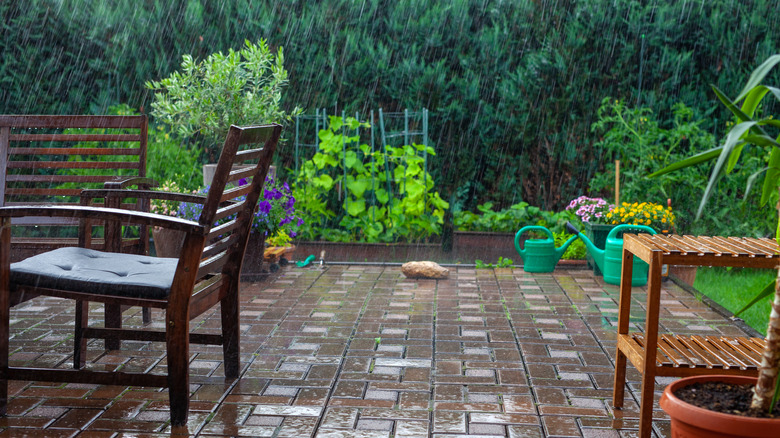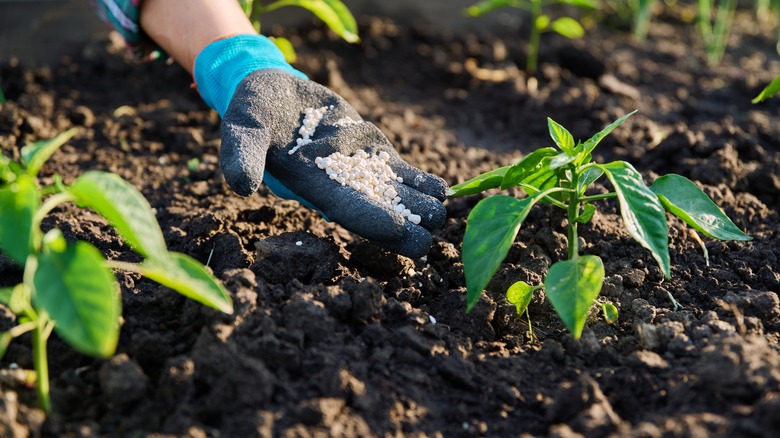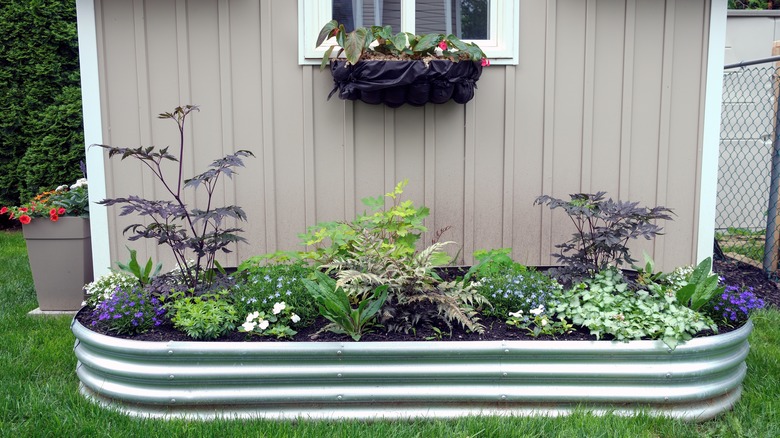Tips To Deal With An Overwatered Veggie Garden After A Rainy Day
If it's been raining a lot in your area, you might be concerned that perhaps your garden is getting too much water and might be drowning. Depending on where you live, it can rain heavily and for long periods of time. Some plants won't mind the rain a bit and might even thrive in the damp soil and cooler temperatures, while others will suffer and find that the rain damages their root system. Some tips to deal with an overwatered veggie garden after a rainy day include trenching around beds or plants to divert excess water away and installing sturdy tarps over your garden if the rain continues.
In an exclusive interview with House Digest, master gardener, Tiffany Selvey, explains that "Standing water in a garden is a one-way ticket to root rot, so when dealing with the potential for excess rainfall, defense is the best offense. Once the rain arrives, there's very little you can do to keep it from affecting your garden." If you expect your soil is becoming water-logged, start by checking your plants for yellowing leaves or wilting. And, Selvey states, "Standing water is a tell-tell sign that your garden is over-watered." If this happens, all is not lost. A combination of prevention and response can help save your plants.
Saving your plants from too much rain
When you see signs of water damage appear on your plants, take action as soon as possible to reduce the likelihood of major problems. The roots have limited oxygen supply when the ground is submerged in water, which can lead to root rot and even the death of a plant. Speaking exclusively to House Digest, Selvey states "If your garden is absolutely waterlogged, you could try digging a trench in or around the space to divert water away from plant roots." Excess rain can also cause the soil to become compacted, so to prevent the soil from compacting even further, avoid stepping on the ground around your vegetable plants by using boards or stepping stones to more equally distribute your weight.
While you can't control how much it rains, Selvey recommends using "a pitched tarp carefully and securely placed over small or raised garden beds to help divert the water away." Taking every step to direct water from your garden can go a long way in salvaging your plants after a deluge, and some tasks are a must after heavy rainfall. Heavy downpours tend to wash away vital nutrients from your plants. Once the weather clears up, you should fertilize to make up for what was lost.
You can also focus on helping your plants recover by removing leaves that show signs of damage or disease. You'll also want to get out and check for bugs during and after a rainy day since slugs and other pests thrive in wet soil.
Preparing for excess rain in the future
In this exclusive interview with House Digest, Selvey also offered some advice on preventing major issues after a big rain, "Starting with loose, well-aerated soil can help that excess water flow out. Installing raised beds in particularly rainy regions helps you control the quality of soil, and the layers you use to help can ensure proper drainage, even after the heaviest rains." Consider layering the bed with sticks, branches, and leaves in the bottom half to help promote good drainage and prevent the soil from getting compacted and waterlogged.
A good way to keep track of the rainfall and when to water your plants after a rainy day is to put out a rain gauge. This tool will capture and measure the water so you know about how much it rained. With that information, you can keep close tabs on when you will need to water again, and know the amount of water your garden is getting during periods of excessive rainfall. If you don't live in an area that regularly rains, it's not uncommon for rainstorms to pop up during the summer. Some last only a day, while others can last weeks. Keeping an eye on the weather will allow you to tend your garden beds before and after it rains to avoid an overwatered veggie garden.


